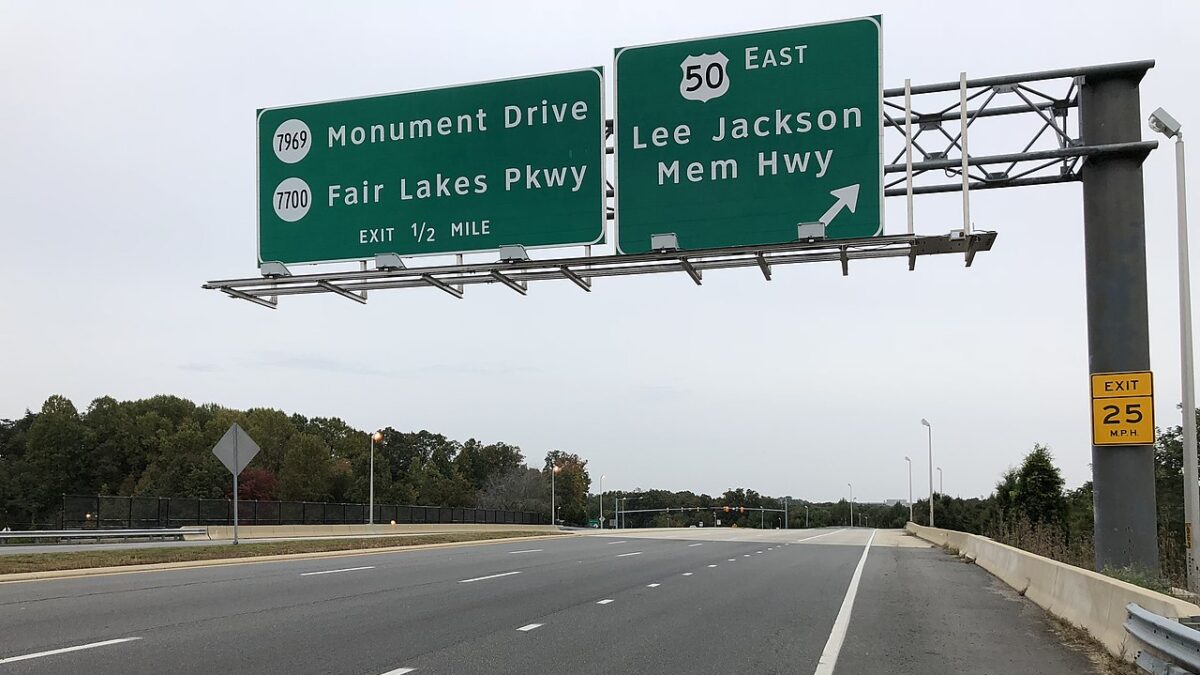
Less than a month after mailing 400,000 postcards to Fairfax County residents requesting their thoughts on renaming prominent roads Lee Highway and Lee-Jackson Memorial Highway, the county’s “Confederate Names Task Force” on 30 November met to vote on the prospective name change. The outcome was perhaps predictable for a predominantly lefty suburb of Washington, D.C.: the task force overwhelmingly voted in favor of changing both road names.
What was quite surprising, however, was that the task force went against the express wishes of the majority of Fairfax County residents, who voted for the Democrat in every presidential election since 2004.
The CNTF’s survey, which was conducted via mail, phone calls, letters, listening sessions, emails, and social media, elicited 40,870 responses on the two names (there were about 30,000 individual responses, but the CNTF broke out responses from individual persons for the two separate road names, which explains the difference in numbers).
Of the 40,870 responses, 23,500, or about 57.5 percent of respondents, expressed their desire for the road names to remain the same. Another 16,265, or 40 percent of respondents, said they wanted the road names changed (about 2.5 percent of respondents had no opinion or their opinion was unclear). Even if we isolate only the mail responses (96.3 percent of responses), the vote is still strongly in favor of preserving the names: 57.3 percent pro-names, 40.6 percent anti-names.
Yet the task force’s vote was even more lopsided in favor of changing the names: 20 out of 26 CNTF members (77 percent) voted to change Lee Highway and 19 out of 26 with one abstention (73 percent) voted to change Lee-Jackson Memorial Highway. Thus the CNTF ignored the opinions of a clear majority of queried Fairfax County residents who responded to the survey.
Moreover, the CNTF acknowledged that the survey elicited more responses than any other recent survey sent by Fairfax County to local residents. Yet, said another CNTF member, “the [CNTF’s] recommendation is not driven by responses.” One wonders, then, what their purpose was?
During a previous CNTF meeting, it was also acknowledged that the total cost of renaming just these two roads would cost between $1 to $4.2 million. “That’s a big number, but in the scheme of things, it’s not a big percentage of the county’s overall budget,” noted one of the CNTF members.
Yet Tom Biesiadny, director of the Fairfax County Transportation Department previously noted that the cost “did not include the in-house costs for changing maps, GPS, etc.” The CNTF also acknowledged it did not even have data on how many businesses — who would also incur expenses regarding the change — were located on these two major roads.
The CNTF will meet on December 13 to devise a list of new road names for the Board of Supervisors to consider. Voting on the CNTF’s final recommendation report will then be presented to the Fairfax County Board of Supervisors on December 20. The Board of Supervisors bears responsibility for making the decisions on whether to change the names and what those new names would be. After that, final approval rests with the Commonwealth Transportation Board.
It’s hard not to conclude that the CNTF is a performative political show, which, as I noted in a previous article, has been going on for months and included many meetings. The CNTF was ostensibly created to demonstrate the county government’s sincere concern about the opinions of the local residents. Yet, as the Fairfax Times reported in late October, Fairfax County Chairman Jeffrey C. McKay had already “hint[ed] name changes are a done deal.”
Indeed, McKay asserted the CNTF would “examine and make recommendations on how both roadways can better reflect our values as we chart a positive path together for the future.” In other words, he claims the road names don’t reflect Fairfax values, and thus must be altered.
It’s also hard not to judge the CNTF as representative of how far government bureaucrats are willing to go to burnish their identity politics credentials and appease a small group of vocal woke activists. As CNTF member Blake Myers rightly observed: “There is no public outcry or support for changing the names, and it is a divisive issue that will drive people into separate camps.” Yet the CNTF went forward anyway, ignoring the opinions of residents and exhibiting a clear bias.
According to a CNTF member who requested anonymity, CNTF Chair Evelyn Spain was told that as chair she did not have to vote. Rather than demonstrate her neutrality on the CNTF, she voted in favor of changing the name. The task force is “very biased,” the CNFT member told me.
One of the CNTF members at the November 30 hearing acknowledged that if the task force voted in favor of changing the roads, it would likely increase local tensions and provoke more anger. Although he was in favor of changing the names, perhaps, he suggested, the CNTF should recommend not making any more changes to local roads, schools, or other locations for the foreseeable future, as a sign of good faith to the local population.
Given how willing the CNTF was to ignore the opinions of county residents, that doesn’t seem likely.








